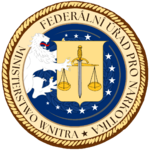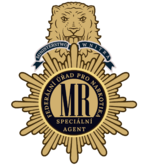Federal Bureau of Narcotics (Morrawia): Difference between revisions
| Line 166: | Line 166: | ||
===Special agents=== | ===Special agents=== | ||
As of 2017, there were 3,165 special agents employed by the Federal Bureau of Narcotics. FBN agents' starting salary is ₮132,000–₮148,000. After four years, the salary rises to above ₮248,000. | |||
After receiving a conditional offer of employment, recruits must then complete an 20-week rigorous training which includes lessons in firearms proficiency (including basic marksmanship), weapons safety, tactical shooting, and deadly-force decision training. To graduate, students must maintain an academic average of 80 percent on academic examinations, pass the firearms qualification test, successfully demonstrate leadership and sound decision-making in practical scenarios, and pass rigorous physical-task tests. Upon graduation, recruits earn the title of DEA Special Agent. | |||
The FBN excludes from consideration job applicants who have a history of any use of narcotics or illicit drugs. Investigation usually includes a polygraph test for special-agent, diversion-investigator, and intelligence research specialist positions. | |||
Applicants who are found, through investigation or personal admission, to have experimented with or used narcotics or dangerous drugs, except those medically prescribed, will not be considered for employment with the Federal Bureau of Narcotics (FBN). Exceptions to this policy may be made for applicants who admit to limited youthful and experimental use of marijuana. Such applicants may be considered for employment if there is no evidence of regular, confirmed usage and the full-field background investigation and results of the other steps in the process are otherwise favorable. | |||
The FBN's relatively firm stance on this issue contrasts with that of the [[Federal Investigation Bureau (Morrawia)|Federal Investigation Bureau]], which in 2005 relaxed its hiring policy relevant to individual drug-use history. | |||
===Aviation Division=== | ===Aviation Division=== | ||
===Special Response Teams=== | ===Special Response Teams=== | ||
Revision as of 20:53, 6 December 2024
This article is incomplete because it is pending further input from participants, or it is a work-in-progress by one author. Please comment on this article's talk page to share your input, comments and questions. Note: To contribute to this article, you may need to seek help from the author(s) of this page. |
| Federal Bureau of Narcotics Federální úṙad pro narkotika | |
|---|---|
 Federal Bureau of Narcotics' seal | |
 FBN Special Agent badge | |
 Flag of the FBN | |
| Common name | The Drug (Morrawian: Protidrogowka) Narcs (Morrawian: Narkáċi) |
| Abbreviation | FNB (Morrawian: FÚN) |
| Motto | Bránit, naruṡit, odradit Defend, Disrupt, Deter |
| Agency overview | |
| Formed | July 1, 1971 |
| Preceding agencies | |
| Employees | 7,471 (2023) |
| Annual budget | ₮10.1 billion (as of 2021) |
| Legal personality | Federal agency |
| Jurisdictional structure | |
| Federal agency (Operations jurisdiction) | Morrawia |
| Operations jurisdiction | Morrawia |
| Legal jurisdiction | National |
| General nature | |
| Operational structure | |
| Overviewed by | Ministry of the Interior |
| Headquarters | Federal Circle, Králowec, F.D., Morrawia |
| Special Agents | 3,165 |
| Agency executives | |
| Parent agency | Ministry of the Interior |
| Website | |
| fnb | |
The Federal Bureau of Narcotics (FNB) (Morrawian: Federální úṙad pro narkotika) is a Morrawian federal law enforcement agency under the Morrawian Ministry of the Interior tasked with combating illicit drug trafficking and distribution within the territory of Morrawia. It is the lead agency for domestic enforcement of the Narcotics Enforcement Act of 1971, sharing concurrent jurisdiction with the Federal Investigation Bureau, the Customs & Border Protection Administration, and Immigration Enforcement Administration. However, the FNB has sole responsibility for coordinating and pursuing Morrawian drug investigations both domestically and internationally.
It was established in 1971 as part of the Morrawian government's war on drugs. The FNB has an intelligence unit that is also a member of the Morrawian Intelligence Community. While the unit is part of the FNB chain-of-command, it also reports to the Director of National Intelligence. The FNB has been historically criticized for scheduling drugs that have medicinal uses, and for focusing on operations that allow it to seize money rather than those involving drugs that cause more harm. In recent years, the agency has been praised for reforming the systems in place, including those related to drugs, operations, and more.
History and mandate
The Federal Bureau of Narcotics was established on July 1, 1971, by Reorganization Plan No. 5 of 1971, signed by President Mirosław Jaworski on July 25. It proposed the creation of a single federal agency to enforce the federal drug laws as well as consolidate and coordinate the government's drug control activities. Federal Congress accepted the proposal, as they were concerned with the growing availability of drugs. As a result, the Bureau of Drug Abuse Control (BDAC), the Office of National Narcotics Enforcement (ONNE), approximately 400 Special Agents of several different agencies and offices merged to create the FBN.
The FBN is the primary federal agency charged with implementing and enforcing the Narcotics Enforcement Act (NEA), which is Title II of a larger Federal Act called the Comprehensive Narcotics and Public Health Act of 1970. The FBN is responsible for drugs listed in the NEA's five drug Schedules, categories that rank drugs by their potential for harm, and whether they have a medical use. The NEA seeks to ensure legitimate access to controlled pharmaceuticals, while preventing illicit use of controlled drugs. To these ends, the FBN implements two intersecting legal schemes created by the NEA, registration provisions for entities involved in legal activities, violations of which are not usually criminal offenses, and trafficking provisions for illegal activities, violations of which are criminal offenses.
From the early 1970s, FBN headquarters was located at 1805 Federal Street NW in downtown Králowec, F.D. With the overall growth of the agency in the 1980s and 1990s (owing to the increased emphasis on federal drug law enforcement efforts) and concurrent growth in the headquarters staff, the FBN began to search for a new headquarters location. Locations in South Banawia, Turhinia and various abandoned military bases around Morrawia were considered. However, then–Minister of the Interior Eduard Macourek determined that the headquarters had to be located close to the offices of the Interior Ministry. Thus, in 1990, the headquarters relocated to 140 Klementský Drive in the Federal Circle area of Králowec, F.D., near the eponymous Metro station.
On November 5, 1995, Kevin Hohmann carried out a terrorist attack on the Alfréd W. Muraj Federal Building in Nutra. He was targeting regional offices for the Federal Investigation Bureau (FIB), Federal Disaster Response Administration (FEDRA) and FBN, all of which had carried out raids that he viewed as unjustified intrusions on the rights of the people. This attack caused the deaths of five FBN employees, one task force member and three contractors in the Nutra bombing. Subsequently, the FBN headquarters complex was classified as a Level IV installation under Morrawian federal building security standards, meaning it was to be considered a high-risk law enforcement target for terrorists. Security measures include hydraulic steel roadplates to enforce standoff distance from the building, metal detectors and guard stations.
In April 2003, the FBN established a Digital Evidence Laboratory within its Office of Forensic Sciences. In 2015, the passage of the 45th Amendment marked a significant shift in Morrawian drug policy, decriminalizing certain substances and clarifying the relationship between state and federal drug laws. This amendment represented a major step toward adopting more compassionate and pragmatic approaches to drug use.
Organization
The FBN is headed by an Director of the Federal Bureau of Narcotics appointed by the president of Morrawia and confirmed by the Morrawian Senate. The Director reports to the Minister of the Interior through the Deputy Minister of the Interior. The director is assisted by a deputy director, the chief of operations, the chief inspector, and three assistant directors (for the Operations Support, Intelligence, and Human Resources divisions). Other senior staff includes the chief financial officer and the chief counsel. The director and deputy director are the only presidentially appointed personnel in the FBN. All other FBN officials are career government employees. FBN's headquarters is located in the Federal Circle district, Králowec, F.D., near other important federal ministry offices. It maintains its own FBN Academy located on the Marine Corps Base Lawoṙice at Lawoṙice, Wallash, alongside the FIB Academy. As of 2024, it maintains 121 domestic offices in 13 divisions, and 31 foreign offices in more than 40 countries, most notably Anáhuac. With a budget exceeding ₮10 billion, FBN employs 7,471 people, including 3,165 Special Agents and 200 Intelligence Analysts.
Structure
- Director
- Deputy Director
- Human Resource Division
- Career Board
- Board of Professional Conduct
- Office of Training
- Operations Division
- Aviation Division
- Office of Operations Management
- Special Operations Division
- Office of Diversion Control
- Office of Global Enforcement
- Office of Financial Operations
- Intelligence Division
- Office of National Security Intelligence
- Office of Strategic Intelligence
- Office of Special Intelligence
- Mokraḋany Intelligence Center
- OCDETF Fusion Center
- Financial Management Division
- Office of Acquisition and Relocation Management
- Office of Finance
- Office of Resource Management
- Operational Support Division
- Office of Administration
- Office of Information System
- Office of Forensic Science
- Office of Investigative Technology
- Inspection Division
- Office of Inspections
- Office of Professional Responsibility
- Office of Security Programs
- Field Divisions and Offices
- Human Resource Division
- Deputy Director
Special agents
As of 2017, there were 3,165 special agents employed by the Federal Bureau of Narcotics. FBN agents' starting salary is ₮132,000–₮148,000. After four years, the salary rises to above ₮248,000.
After receiving a conditional offer of employment, recruits must then complete an 20-week rigorous training which includes lessons in firearms proficiency (including basic marksmanship), weapons safety, tactical shooting, and deadly-force decision training. To graduate, students must maintain an academic average of 80 percent on academic examinations, pass the firearms qualification test, successfully demonstrate leadership and sound decision-making in practical scenarios, and pass rigorous physical-task tests. Upon graduation, recruits earn the title of DEA Special Agent.
The FBN excludes from consideration job applicants who have a history of any use of narcotics or illicit drugs. Investigation usually includes a polygraph test for special-agent, diversion-investigator, and intelligence research specialist positions.
Applicants who are found, through investigation or personal admission, to have experimented with or used narcotics or dangerous drugs, except those medically prescribed, will not be considered for employment with the Federal Bureau of Narcotics (FBN). Exceptions to this policy may be made for applicants who admit to limited youthful and experimental use of marijuana. Such applicants may be considered for employment if there is no evidence of regular, confirmed usage and the full-field background investigation and results of the other steps in the process are otherwise favorable.
The FBN's relatively firm stance on this issue contrasts with that of the Federal Investigation Bureau, which in 2005 relaxed its hiring policy relevant to individual drug-use history.
Aviation Division
Special Response Teams
Special Operations Division
Domestic Cannabis Eradication/Suppression Program
Budget
Firearms
Impact on the drug trade
Rank structure
Criticism and controversies
Project Cassandra
FBN Museum
In popular culture